Views of Possible Gentrification In Hastings - Our Survey
- Coastal Action

- Nov 30, 2019
- 4 min read
Updated: Mar 30, 2021
Following on from our last post of a rather well-turned-out meeting hosted by #ChangingHastings with around a total 120 turnout to our "Town meeting" styled event, we actually ran out of surveys to hand out due to the attendance surprisingly being above 100 people. This means we could not sample everyone who attended. However, we feel that a return of 75 survey responses out of 120 attendees is sufficient to feel this was how people felt on the night. Below are the findings we recorded from the meeting, primarily recorded from the surveys answered.
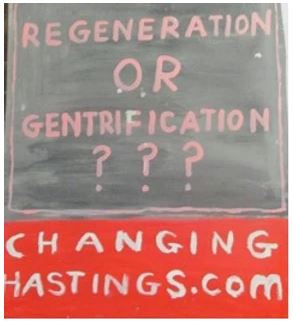

Responses to an open question - How do people feel about the debate around the town and Gentrification?

Do Residents recognise rapid large-scale change, which is needed for gentrification to be possible, is happening?
People who attended the event mostly thought that social and economic change was occurring within the Hastings & St Leonard’s area. There was disagreement over the rate of social and economic changes discussed at the town meeting. 45% of people thought change has been developing in the area slowly, indicating that a large body of people might think Hastings is being slowly regenerated than gentrified. However, still, 40% of the audience felt a change was occurring at a rapid rate, indicating many in the audience may have felt gentrification was the main topic being debated in the event. Therefore, perhaps this audience reflected the debate of regeneration vs gentrification that the town is talking about.
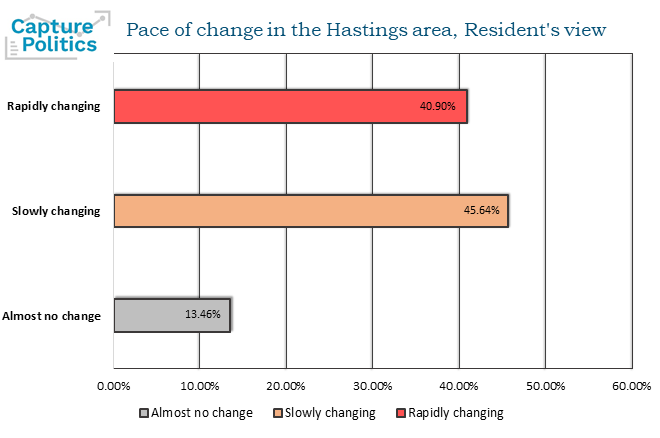
To what extent do Residents Support Change that was identified in the Town Meeting?
The social and economic change identified throughout the meeting experienced a wide mixture of levels of support. Mostly, on average, residents have accepted some change has been needed and positive for the town, however, some residents have become increasingly concerned this continued pace of change is now becoming bad for the town.
Was the change that was Identified in the meeting deemed to Improve or Worsen Residents Lives?
Again, there was quite a wide distribution of opinions in how people felt towards the social and economic changes discussed at the event. Slightly more than a third felt that the changes discussed had improved their life overall, however, it must be noted that there was also a large group of people who’s was concerned that regeneration was turning into gentrification and would in the end adversely affect their lives.
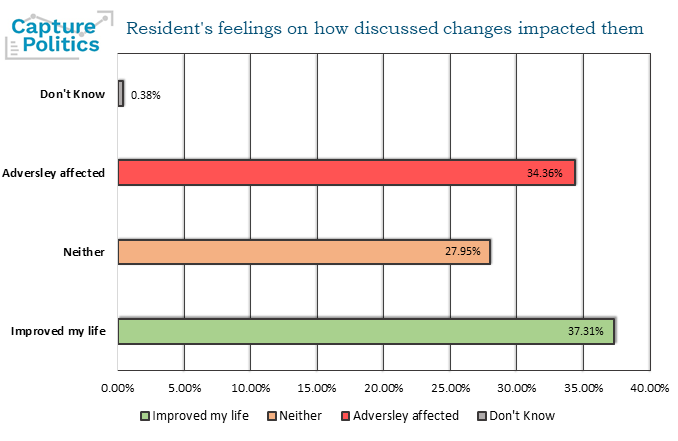
Was change identified in the meeting thought to financially benefit, or finically hinder, people who attended?
The question asking if people at the event felt the social and economic changes discussed improved their individual finances found a wide spread of results. This again indicates some feel the town is going through a slow regeneration process, whilst some feel it has tipped over into gentrification.
Of the positive changes identified how included did people who attended the meeting feel?
Again, there was a wide diversity of views on how people affected by changes discussed at the event. Some people felt they could participate in social changes taking place, whilst others felt shut out of such changes. This again highlights the debate between regeneration and gentrification the town is having.
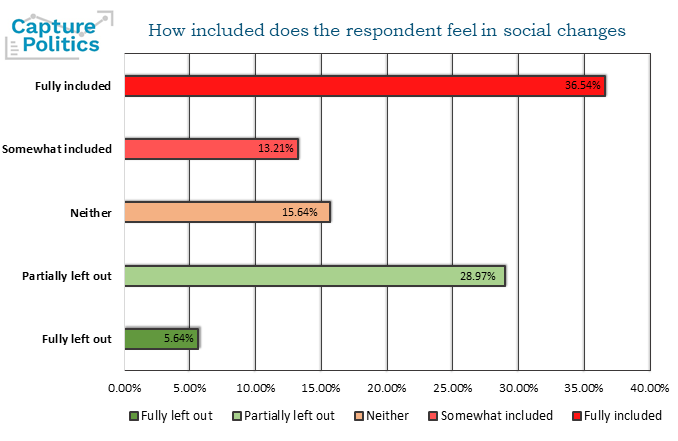
Of the social changes discussed in the meeting to what extent did residents feel it hurt the local identity of Hastings?
There was a wide and even distribution of responses on how changes discussed at the event affect the Town’s Identity. There were both noticeably large groups of people who felt the town’s identity was being improved, through regeneration, whilst another group clearly felt the change was going too far and was likely to be a process of gentrification and harm the town in the long run.
What might have caused widespread disagreement on opinions concerning how recent changes have impacted Hastings?
Length of Residence Might be key to understanding the regeneration vs Gentrification debate.
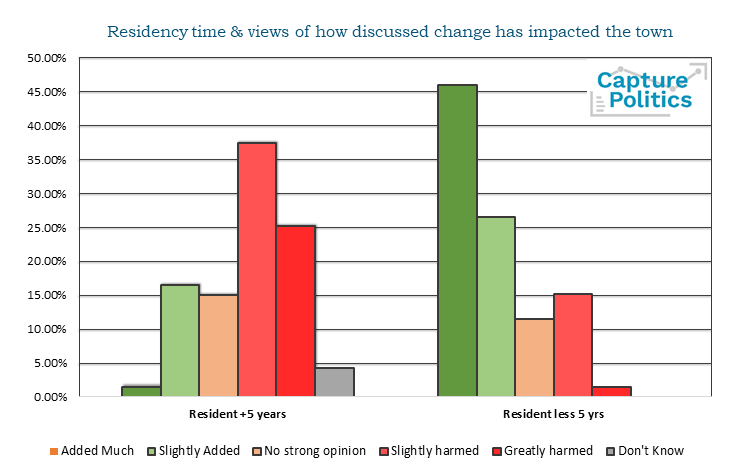
The clearest divide that existed amongst people who attended the event discussing social and economic change was how long the respondent has been a resident in the Hastings area. Newer residents tended to see the change as slower paces and beneficial to the area, where longer-term residents see the changes as faster paced and harmful to the area.
The table above shows that on all the questions asked more positive responses towards change were overwhelmingly supported by newer residents compared to longer-term residents. More negative responses were selected mostly by longer-term residents, with fewer newer residents feeling negative towards change. This indicates that the wide distribution of positive and negative responses to our survey may have been driven by a divide of a vision for the town that new older residents have compared to the newer residents. This may come from different experiences these different groups have, which in turn have created different expectations for the Town.
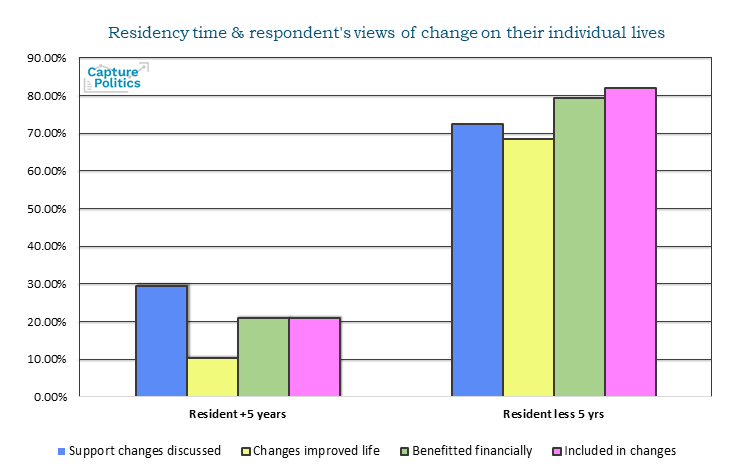
Why might newer residents' experiences and expectations be different?

Out of Newer residents that came to the event, those that moved to the areas in the last 5 years, most came from London or Brighton. These places have experienced many social and economic changes as these urban cities and larger towns have been exposed to globalisation more, and as a result, are experienced more to cosmopolitan lifestyles. When these people arrive in Hastings they see a town that has experienced little change and rationally think some developments need to take place. Long-term residents sometimes see a wave of developments as gentrification and too much change, whilst these new arrivals see this as normal levels of change as they are used to higher levels of change having lived in globalised areas. As a result, these residents have a different attitude to longer terms residents as their experiences differ before witnessing change debated in Hastings. Therefore, this might be the cause behind differing opinions in Hastings which can both support and oppose change brought by this process.
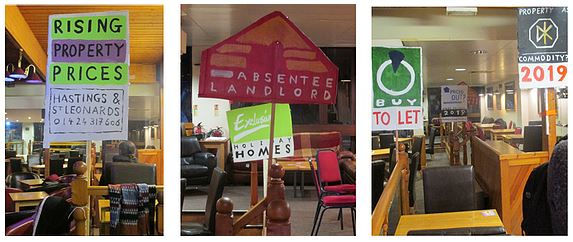



Comments